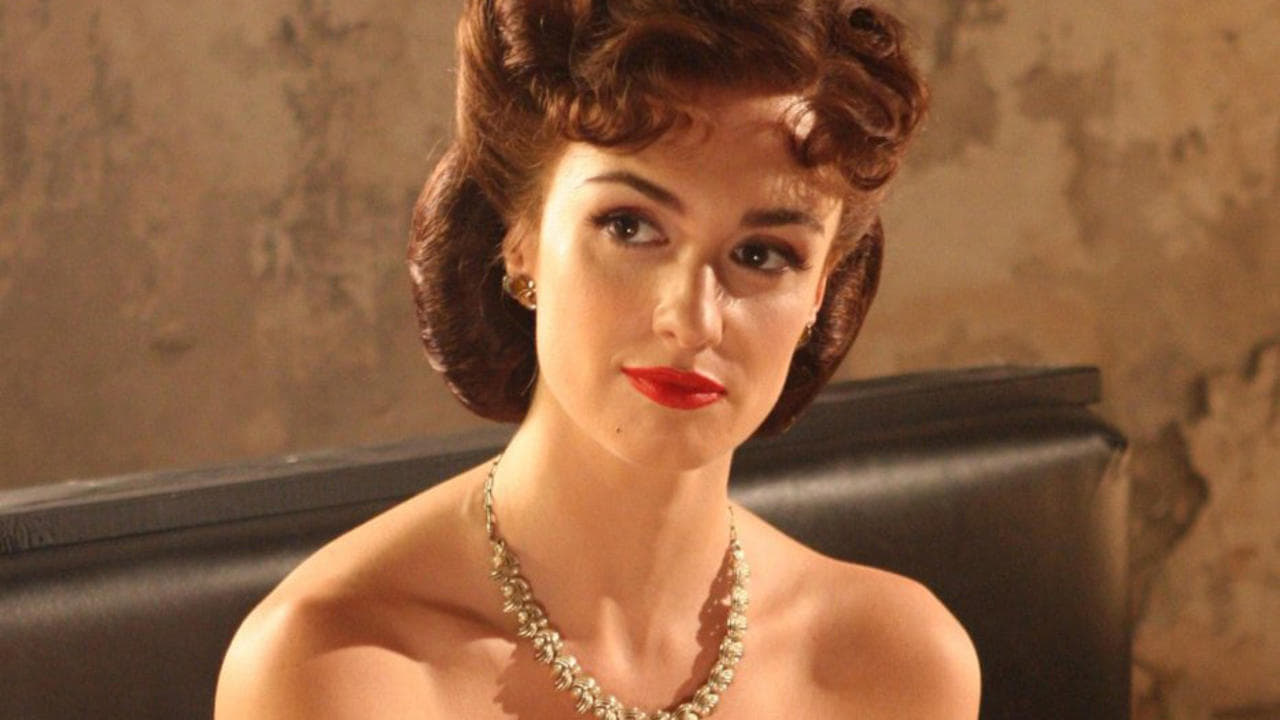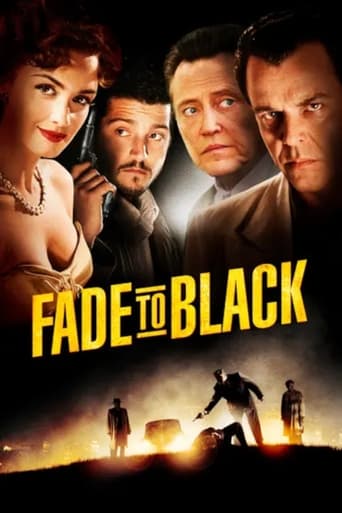

Danny Huston is Orson Welles in "Fade to Black," a 2006 release, directed by Oliver Parker, and featuring Paz Vega, Diego Luna, Christopher Walken, Anna Galiena, and Nathaniel Parker.In this story, Welles goes to Italy after his divorce from Rita Hayworth to make a film, "Black Magic." He also wants to raise money for his film version of "Othello." While in Italy, one of the actors in the film is murdered, and as he's dying, he whispers the word "Nero" in Orson's ear. Welles intends to find out who killed him. But he finds himself not only involved with shady characters, but embroiled in the politics of the country. As time goes on, he begins to hear different stories about the actor, somewhat contradictory in nature. On top of which, Tyrone Power is a much bigger star in Italy and Welles keeps coming up short, except on a hit list!This is a nice blend of fact and fiction. Welles did go to Europe around this time, and he made several films, which he often did when he was trying to get money together. His marriage to Rita Hayworth was a complicated one. When his political ambitions led nowhere in the '40s, Rita, so desperate to get out of show business, turned to Aly Khan instead. Welles adored her, but her insecurities made her difficult to live with and was a bad combination with his egotism.It's doubtful that Welles would have gotten himself mixed up in anything that didn't somehow lead to his own self-aggrandizement, but I could have gone along with it if the script had been better. It tries to cram in too much plot.Italy after the war was a horrific mess. The production values for "Fade to Black" are wonderful and show the post-war ruination, as well as striking differences between rich and poor. Of course, Cinecitta the film studio is in Rome, and Tombolo, the place where deserters and collaborators escaped, is way up north, though it's not clear if they're speaking of a district or the city. In any event, it's a wooded area seemingly not far from Rome. The word tombolo has more to do with a mound or beach, so the woods would be the name for it.Danny Huston doesn't look or sound like Welles, except on the film that plays behind his magic act - there we see him in the typical Welles big overcoat and hat, in black and white. He does a good job, though I do believe Welles was a bit showier. As the mother and daughter who knew the murdered actor, Paz Vega and Anna Galiena are gorgeous and look just like mother and daughter. Both have a mysterious aura which adds to the film.The denouement is no surprise. Still, this is an enjoyable film about one of Hollywood's most electrifying people, a brilliant maverick with a flamboyant personality. Sadly, though he resented the discipline and structure dictated by a Hollywood studio, he needed it. Once he left, he was never the same.
... View MoreI'm not sure how this was as a novel, but the film version has the classic flaw of all book adaptations. In trying to cram hundreds of pages of narrative into a couple of hours on screen, things need to be cut out. Sometimes things that are important, even vital, to the prose have to be sacrificed to the demands of cinema and other elements expanded or enhanced to take their place. Fade to Black has a great setting and a great hook but needed to severely restructure its plot in order to take full advantage of them. Any movie about genius filmmaker Orson Welles also needs to be a hell of a lot more visually imaginative than this. Those weaknesses mean that a film which starts out quite strong and has a lot of initial appeal, never manages to fulfill your expectations. Watching it is an okay experience, but also vaguely disappointing.In 1948, with his career on the down slope and his personal life in ruins, Orson Welles (Danny Huston) travels to Italy to play the bad guy in a two-bit production called Black Magic. After one of his co-stars mysteriously dies, Welles decides to investigate and finds himself caught up in the political intrigue of Italy's first post-war election and winds up a name on somebody's hit list. With the aid of his driver, Tommaso (Diego Luna), and the distracting motivation of a beautiful actress, Lea (Paz Vega), Welles discovers that reality is more twisted than any fantasy he can dream up.Fade to Black has three major strengths. Well four, if you count the presence of Paz Vega. Danny Huston is very appealing as Orson Welles. Who's to say how personally accurate the portrayal is, but Huston does a fine job at capturing the essence of a wunderkind that was no longer a kind who felt no rules applied to him and didn't handle it well when he discovered some did. The moments here that play up Welles love of filmmaking are nicely contrasted by his conflicted relish of fame and dread of celebrity. Plopping Welles down into the middle of a murder mystery is also a great idea. So is using Welles as a window into the turmoil of post-Mussolini Italy and the dawning of Cold War political manipulation.Unfortunately, combining the mystery and the political machinations proves to be too much for the film to tolerate, especially when it turns out neither has much to do with the other. Perhaps they were woven together better in the novel. Here, each vies for your attention and stunts the growth of the other. When it comes time for big developments in either the murder or the political underhandedness, it feels a bit hollow because there hasn't been the proper build up. One of them needed to be kept in the background, with the other come fully to the foreground and a subplot involving the fate of Italian Jews and an ill fated Resistance cell should have been done away with entirely. As it is, Fade to Black starts out entirely about the mystery, then becomes totally about the politics, then flips back and forth between the two until the very end.I don't want to be overly critical because I did like this movie. It came so close to being a lot better than it is, though, it's hard not to be caught up in those lamentable failings. If writer/director Oliver Parker had embraced Huston's Welles as the story's heart and soul and not felt obligated to elevate Diego Luna's Tammaso to nearly his equal, which may have been true to the Italian novel this is based upon but is nothing but false to the potential of this movie, he might have made something compelling. What he created instead was merely satisfactory. That's much better than most but in this instance, it isn't enough.
... View MoreThis is one of those 'what if' conceits that sometimes come off spectacularly and more often than not bomb. This time around we are asked to surmise 'what if' Orson Welles couldn't get arrested in Hollywood in the late forties and in the wake of his separation and impending divorce from Rita Hayworth found himself playing the lead in a cheesy costume picture in Italy and on the side got involved in both murder and local politics. Like all 'what if's there's a modicum of truth here; Welles did exile himself in Europe in 1948 where he did appear in some fairly dire movies and, of course, he was divorced from Rita Hayworth around that time. The film has him lining up an investor for his version of Othello to be shot in Italy when the current film is in the can whereas although he did write, direct and star in Othello it was actually made in Morocco in 1952. Danny Huston really needs to do more than wield a cigar to come over as Welles and perhaps wisely he makes no attempt to reproduce that distinctive timbre though he might have had a stab at that impish twinkle in the eye that was so much a part of Welles. Pick of the rest is Anna Galieni, so great in The Hairdresser's Husband for Patrice Leconte. As a curio this is worth a look but that's about it.
... View MoreI enjoyed this movie immensely. It captures the sense of Orson Welles as an adventurer, trying to raise money for movies which he understands better than those around him and instead making ones for other people which he knows are rubbish. On his travels in 1948 Italy, he stumbles into a murder mystery connected, perhaps too loosely, with a political conspiracy.It's cleverly made and very funny. I loved the playfulness which nodded at Welles's work without doing anything as crass as obvious references. It's an enjoyable story. Not a great thriller, the insights and revelations weren't surprising but that only made it more real and engrossing.Huston was encouraged to do part Orson and part his Father, John. He's a likable, believable hero matched by a good, mainly Serbian cast. Paz Vega is excellent as the heroine and Diego Luna gives a wonderful turn as the second hero to Welles, reminds me of James Macavoy, only likable.
... View More